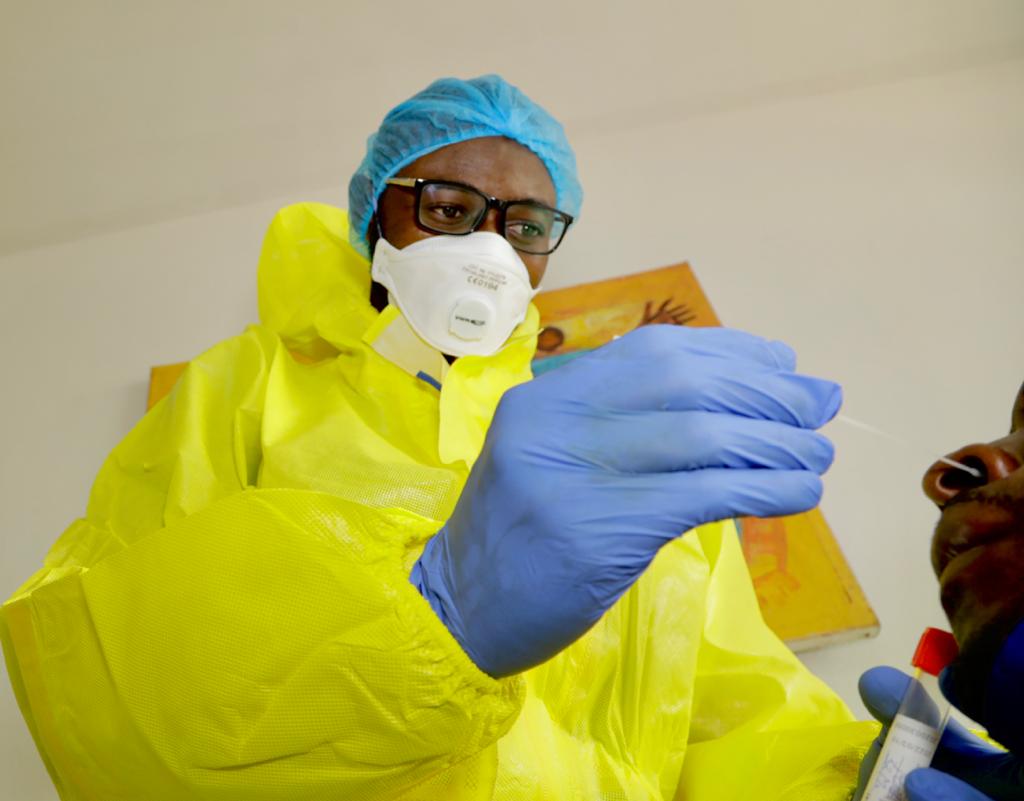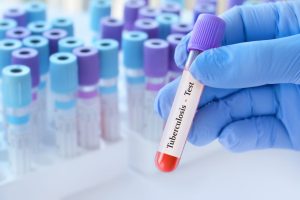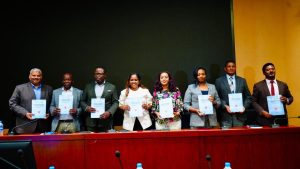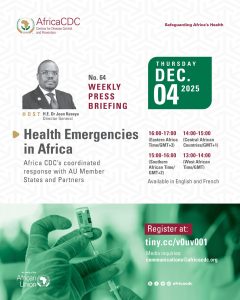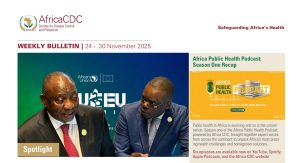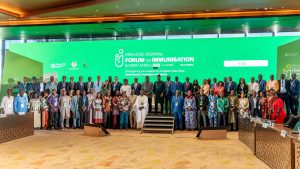- Strategy encourages countries to adopt rapid antigen tests to scale-up COVID-19 testing.
- The Partnership to Accelerate COVID-19 Testing (PACT) has been working to source 11 million rapid antigen tests for Africa.
- The new Guidance on Use of Rapid Antigen Tests for COVID-19, the Quality Assurance Framework and training materials will help African countries to quickly increase rollout of rapid antigen testing, toward achieving less than five percent test positivity rates.
ADDIS ABABA, ETHIOPIA, 17 DECEMBER 2020 – The Africa Union Commission, through the Africa Centres for Disease Control and Prevention (Africa CDC) and partners, has released a new Guidance on the Use of Rapid Antigen Tests for COVID-19 Response, as part of a strategy to quickly expand antigen testing for COVID-19 in Africa. Together with the Quality Assurance Framework for SARS-CoV-2 Antigen Rapid Testing for Diagnosis of COVID-19 and the SARS-CoV-2 antigen rapid diagnostic test training materials, experts hope that the document will help increase rapid antigen testing capacity across Africa as quickly as possible.
As the continent witnesses new spikes in COVID-19 cases and deaths, the Commission calls on Member States to prioritize rollout of rapid antigen testing as part of an urgent effort to increase national COVID-19 testing capacity and better manage the pandemic, towards achieving test positivity rates of less than five percent.
“We have made significant progress in Africa in terms of testing, but we must acknowledge that we are not there yet. The antigen test is a game changer that Member States should adopt to boost the capacity of countries to rapidly scale-up and increase testing with quicker turnaround time for obtaining test results,” said Dr John Nkengasong, Director of Africa CDC.
In September 2020, the World Health Organization (WHO) recommended the use of rapid antigen diagnostic tests in response to the challenges countries are facing with scaling up testing using the nucleic acid amplification testing (NAAT). NAAT is costly and often requires more than two days to return test results and this seriously limits its widespread use especially in hard-to-reach communities. The speed of testing and reporting of results to individuals and public health authorities for isolation and contact tracing is essential in stopping the spread of COVID-19.
This new strategy by the African Union Commission is part of the Partnership to Accelerate COVID-19 Testing (PACT), which the Commission rolled out in June 2020 to rapidly increase testing, tracing and treatment capacity for COVID-19 response across Africa. Led by Africa CDC, this global network of partners has been working hard since September 2020 to source more than 11 million rapid antigen test kits for distribution to Member States.
Testing is a key first line of defense against COVID-19 that enables early identification and isolation of cases to slow transmission and enhance provision of targeted care to those infected while continuing with other vital healthcare services.[i] Testing is also key to the successful delivery of COVID-19 vaccines.
Antigen tests are more affordable, easier to use, and provide results within 15 minutes at the point-of-care. The new guidance document provides recommendations to health authorities as well as laboratory and clinical personnel in Africa on the use of rapid antigen tests. The accompanying quality assurance framework and training materials will guide rollout, implementation and evaluation of rapid antigen testing.
“The availability of high performance antigen rapid testing provides the opportunity to truly deploy testing for more effective epidemic control and to expand testing beyond the more restricted and traditional settings,” said Mr Ndlovu Nqobile, Chief Executive Officer, African Society for Laboratory Medicine, a PACT partner organization.
In addition to providing the guidance and framework documents, PACT partners are calling on African Union Heads of State to prioritize financing and scaling up of COVID-19 testing as a key agenda item for their upcoming summit in February 2021. Even as COVID-19 vaccination grabs global attention now, and with the likelihood that this will intensify in coming months, Member States need to recognize rapid testing as an immediate solution to aid the reopening of economies and support uninterrupted services for HIV, tuberculosis, malaria and other diseases.
“Even with vaccine availability, testing remains the backbone of the COVID-19 response, providing essential data for decision-making by governments and policymakers. Rapid antigen tests will allow a significant scale-up of testing capacity, and the new guidance on key use cases will ensure that testing can be deployed when and where it will have the greatest impact,” said Dr Catharina Boehme, Chief Executive Officer, Foundation for Innovative New Diagnostics, a PACT partner organization.
COVID-19 rapid antigen testing is recommended as a high performing test for individuals with symptoms, high-risk populations, healthcare workers or essential workers and contacts in settings where NAAT is not available or where turnaround time for NAAT results is prolonged. It is also recommended for use in settings such as borders or points of entry, workplaces, educational institutions, correctional facilities, or other closed facilities with suspected or confirmed cases.
About PACT
PACT was established by Africa CDC as a strategy to help increase COVID-19 testing and reduce its transmission in Africa. The partnership is mobilizing experts, community workers, medical supplies and other resources to support Test, Trace and Treat for COVID-19 in a timely manner and to minimize the impact of the pandemic on the continent.
Contacts
James Ayodele, Principal Communication Officer, Africa CDC; Email: ayodelej@africa-union.org
Nahashon Aluoka, Regional Advisor, East and Southern Africa, Pandemic Action Network; Email: Nahashon.aluoka@pandemicactionnetwork.org; +254724584651
[i] World Health Organization. COVID‑19 Strategy Update. 14 April 2020 (https://www.who.int/publications/i/item/covid-19-strategy-update—14-april-2020, accessed 24 November 2020).

